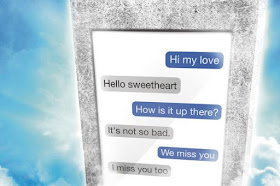...or one who inquires of the dead,...For all that do these things are an abomination unto the LORD..... Deuteronomy 18:11,12
Q: Does that include Chatbots? This gray area for Lucifer to Lurk in.
"While professing to bring the living into communication with the dead, the prince of evil exercises his bewitching influence upon their minds." E.G.W.
"In April, at the height of the coronavirus pandemic, half a million
people downloaded Replika — the largest monthly gain in its three-year history. Eugenia designed a chatbot called Replika.
A cross between a diary and a personal assistant, Replika asks users a
series of questions, eventually learning to mimic their personalities.
The goal is to get closer to creating a digital avatar that would be
able to reproduce us and replace us once we’re dead, but also one that
is able to create “friendships” with humans.
Eugenia, who was herself an entrepreneur and software developer,
had
been working on a messenger app called Luka that used AI to emulate
human dialogue. Inspired by an episode of the show “Black Mirror” in
which a young woman, Martha, shattered by the loss of her boyfriend Ash,
installs an app that allows her to keep communicating with him, Eugenia
decided to modify Luka.....In the days following his death, Roman’s friend Eugenia Kuyda reread
thousands of text messages that she had exchanged with him starting in
2008, the year they met. Another acquaintance asks him if God and the soul exist..... he says no. “Only
sadness.”
Since the second half of
2017, over two million people have downloaded Replika onto their mobile
devices.
Eugenia continues to develop the bot’s emotional
responsiveness so that it will become even more of a “virtual friend”
that users can confide in. In other words, Replika is the real-life
version of Samantha from the movie “Her”: a chatbot that can empathize
with a human by using a type of deep learning, called sequence-to-sequence, which learns to think and speak like a human by processing transcripts of conversations they’ve had during their lifetimes.
Luka
and Replika are not the only inventions designed to give a voice to the
digital ghosts of the deceased. A few years ago, James Vlahos, an
American journalist who has been an AI enthusiast since childhood,
created what he calls a “Dadbot.”
“My ultimate goal is to bridge the gap between life and death by eternalizing our digital identity,” says Rahnama, who is also founder of Flybits, a cloud-based service that modifies the behavior of mobile apps based on where and how the customer is using it. “Your physical being may die, but your digital being will continue to evolve with the purpose of helping people and maintaining your legacy as an evolving being.” Recorded in digital form, he would then create algorithms to answer questions posed to us from beyond the grave, creating a “new form of inter-generational collective intelligence”.
Microsoft has filed a patent which raises the intriguing possibility of digitally reincarnating people as a chat bot.What’s more, “a 2D/3D model of the specific person may be generated using images, depth information, and/or video data associated with the specific person”. The software would use data such as images, voice notes, social media posts, emails, among others... this may open up the possibility of creating software that sounds identical to deceased people, which could usher in a new era for cyber fraud and identity theft.
In keeping up an active interaction with the dead, chatbots appear tokeep us concentrated on “our” death, which is the death of our ties to
the other as we have experienced them, from our exclusive point
of view, up to the point of separation. The chatbots want to make it
possible for us to still receive replies during that moment of
suspension in which we are waiting for an answer, or at least when we
feel the need, softening the pain brought on by the irreversibility of
time and filling the space in between “before” and “after.”
Fascination with resurrection technology is nothing new, and there have been various high-profile attempts at solving for the “problem” of mortality. Barbra Streisand famously cloned her dying dog (paywall) in 2017."
Guardian/Forbes/NYT/TheMitPressReader
***As a side note---notice that someone with a diseased imagination wrote this into a TV show which spread this virus of techno-spiritualism into the mind of someone who made an app for it and that placed into the hands of millions worldwide....





